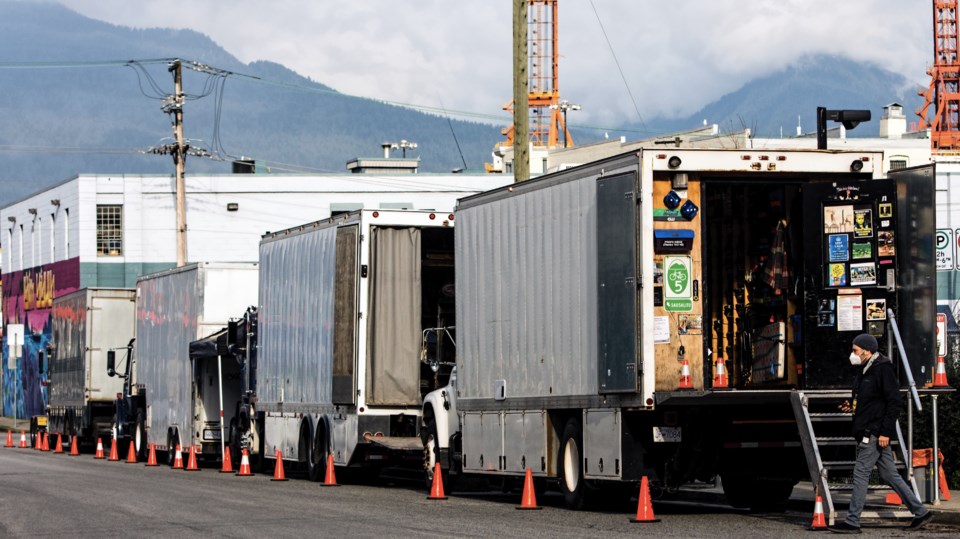B.C.’s film industry has found itself in the crosshairs of U.S. President Donald Trump, who announced plans Sunday to implement tariffs on all films produced outside his country.
“The Movie Industry in America is DYING a very fast death,” said Trump’s post, adding other countries are offering incentives to draw studios outside of the U.S.
His post on social media platform Truth Social stated he has authorized the Department of Commerce and U.S. Trade Representative to institute 100 per cent tariffs on such productions.
“To the folks in the film industry, don’t panic,” B.C. Premier David Eby told reporters Monday.
He said it was hard to understand how the tariffs would be implemented.
Eby also noted two large-budget American productions filmed in B.C., Shogun and The Last of Us, were recently renewed for additional seasons.
“It’s unclear how Trump would even enforce something like this. Tariffs on films? It’s a logistical mess,” Okanagan Film Commissioner Jon Summerland said in an email.
“Are they going to screen every movie for Canadian shooting days?”
He said productions that are already underway in Canada will likely finish as it’s too expensive to pull out mid-shoot.
But Summerland added that some new U.S. productions may pause or shift until things become clearer.
He said this could be a “silver lining” for the domestic film industry, as it would free up crews, gear and space, and create room for Canadian-led projects to step up and fill the gap.
“This is a global film and television production story that would affect B.C., along with every other global production market,” said Leslie Wootton, executive director of the Screen BC industry association. “It would have devastating impacts here in B.C., as it would across the world and in the United States itself.”
She said it remains unclear how such tariffs would be implemented. Wootton said Trump’s announcement comes at a time in which the industry is looking brighter in B.C. following industry challenges like the COVID-19 pandemic and Hollywood guild strikes.
“B.C. stood up to analyze our competitive position—they invested in our tax policy for film and television production to improve our chances,” said Wootton. “It's been a slow recovery, but it's happening.”
She said Trump's announcement was very unsettling with very little meat on the bones.
The announcement lacked clarity on whether this would also impact TV productions, Wootton said, adding such a tariff regime could be aimed at broader entertainment content, including TV.
“We are just going to pay attention to how it develops,” she said. “We're meeting with government and industry partners on how to navigate it going forward. … We're waiting for details to see what an action plan would look like.”
Matthew Shewchuk, president of Vancouver-based production company Big Time Decent Productions Inc., said he was shocked by the announcement.
He said that although tariffs on television shows weren’t explicitly mentioned in the social media post, Trump can be unpredictable.
And while the threat of tariffs could be frightening for most B.C. production companies, Shewchuk said it comes at a time when his company is focusing on growing in the YouTube space.
“We're feeling OK. … Our TV shows are bought and licensed by Canadian broadcasters,” he said. “We have a very good portfolio that's diversified, and we're strong within our own country in terms of creating original IP [intellectual property]. … We're ready to fight and then figure this out.”
But he said there is a very real possibility studios go bankrupt over the long term if the tariffs are enacted.
“All the Canadian service people that work for the Americans … they make razor-thin margins on service deals,” he said. “All the post[-production] facilities that support all these shows that have been shot in Vancouver are going to have a tough time.”
In a Monday announcement, Canadian Media Producers Association CEO Reynolds Mastin said that although details are far from clear, tariffs will cause significant disruptions and economic impacts on both sides of the border.
“Yesterday’s announcement, and the uncertainty it has caused, underscore the incredible importance of ensuring that Canada has a strong, independent domestic media industry,” he said.
At this point, it isn’t clear how tariffs will impact productions filmed in multiple locations around the world.
Following setbacks like the COVID-19 pandemic and the Hollywood guild strikes in 2023, overall U.S. film and television production was down 26 per cent in 2024 compared to 2021, according to production tracker ProdPro.
A survey done on executives regarding preferred filming locations around the world also found that no U.S. location made the top five, with Toronto first, Vancouver third and California sixth, also according to a report by ProdPro.
—With files from the Associated Press



